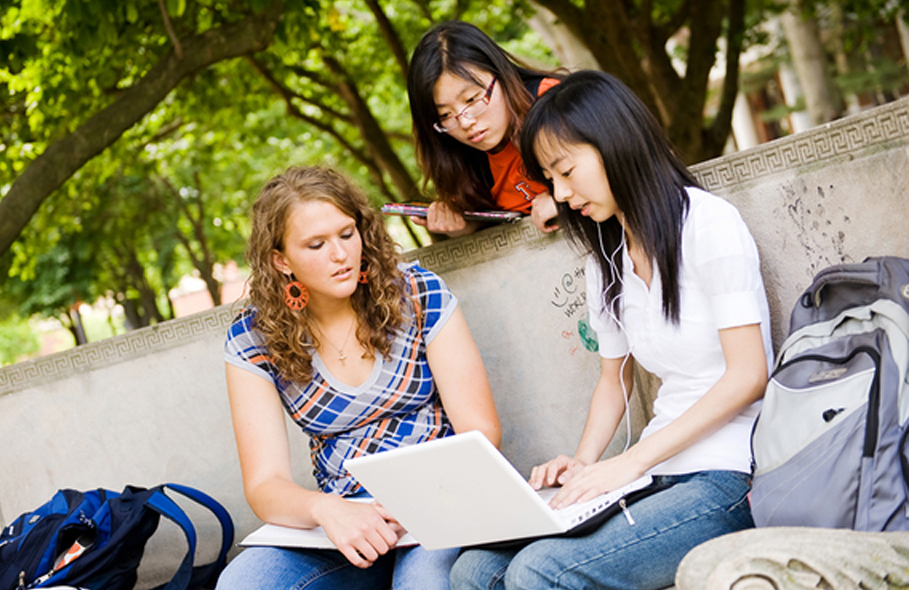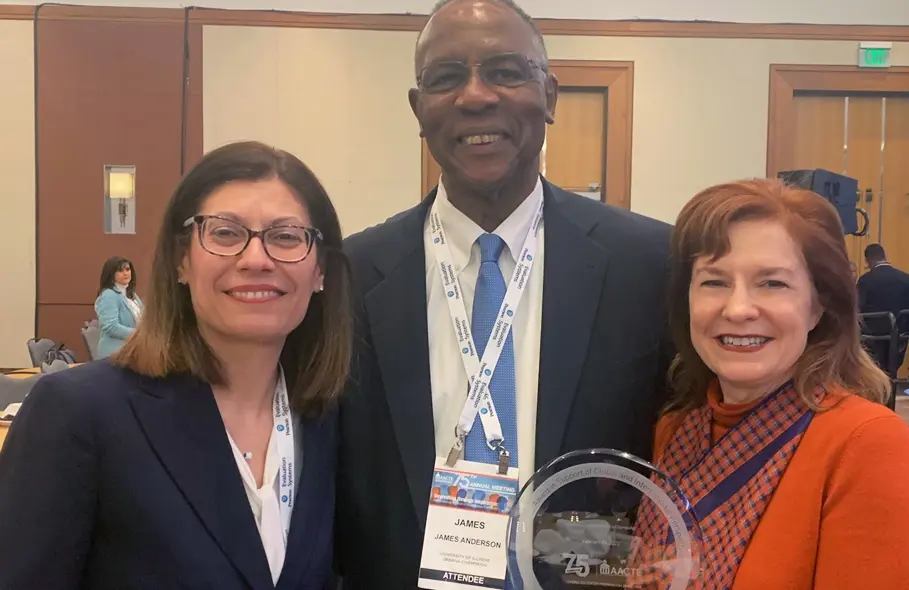iGlobal: Learning to Live in a Global Society
by Tom Hanlon / May 5, 2021

The College of Education is launching a new program that will connect local middle schoolers with their peers across the world as they all learn what it means to live in a global society. College students will help run the program and, in the process, sharpen their online teaching skills.
Pandemics are, of course, never good. But at least one very good thing came out of the COVID-19 pandemic for the College of Education: the creation of its iGlobal program.
iGlobal is an online international program designed to get middle-schoolers from around the world to communicate and collaborate with one another. “We created the curriculum to follow the Sustainable Development Goals set forth by the United Nations,” says Allison Witt, director of International Programs.
The program was inspired by a long-running program between Spurlock Museum and Champaign-Urbana middle schools, says Witt. “Spurlock would bring artifacts related to the history lessons for middle school students to see in person,” she says. “Teachers and students loved this program, pre-pandemic, so we borrowed ideas for our curriculum from them.”
Originally, Witt says, a few area middle schools wanted assistance from the College in expanding their foreign language offerings. But COVID-19 put a kink in those plans.
If COVID-19 was a lemon, iGlobal was its lemonade.
“So, we switched gears,” Witt says. “If we were going to teach middle school students that it’s a good thing to know about the rest of the world, what would that look like?”
As it turns out, it looks exactly like iGlobal.
The iGlobal Concept
iGlobal, which launched in April 2021, consists of extracurricular school clubs that work first within their own club and then share their work with, and learn from, other school clubs around the world. College of Education graduate and undergraduate students will be assigned to each club, both domestic and international. “We’ll have a graduate student and probably two undergraduates with each club,” Witt explains. “We want someone with each group who is from the native country or speaks the native language—and also someone who doesn’t, because that’s good for the foreign students too, to have to use English.”
The College students, Witt says, will run the show. “Meetings will be about 45 minutes. They’ll meet weekly with their group and there will be projects they’ll need to do. There’ll be a mix of group activities and individual activities.”
Once activities are completed, each club will post its results for all other clubs to see, and then comment on the results that other clubs post. All the clubs around the world will be working on the same activity during the same two-week period, the approximate length of each lesson.
Initially, iGlobal will consist of about 10 chapters around the world, including chapters in China, Spain, France, Angola, Indonesia, Chile, and possibly Finland. Monticello Middle School and Mahomet-Seymour Junior High School are among the local schools participating from the outset, with the possibility of others coming on board later.
“We think that size is manageable, yet has enough different places, a nice mixture of cultures, to be interesting. I think eventually we could really scale this up, though!” Witt says.
Living in a Global Society
The crux of iGlobal is the drive to prepare students to live in global society. That preparation is not always easy to achieve in small-town schools, Witt notes. “You can teach about diversity, but it’s an abstract concept,” she says. “You have to experience it.”
Far from being a threat—as Witt says it is sometimes presented—globalization presents opportunities. “What are the possibilities for you in a rural community because of a global connection you’ve made?” she says. “How might you benefit, how can you make it work for you?”
iGlobal is important, Witt says, because students “can’t do it on their own. We are all on this planet together. That’s the reality. There’s no other option. We have to learn to talk to each other, to work with each other.
“We’re trying to build a desire to communicate. I want these rural students to realize there’s a great big world out there, and you’re going to want to hear what people across that world are saying.”
Club Activities
Each club will have activities and projects grounded in subject matter such as math, science, music, sports, and the environment. “We want them to see the actual problems,” Witt says, “and then figure out solutions to those problems. We’ll give them the data and they’ll work together to figure things out—with their own club members and then with other members from around the world.”
Lesson themes include:
- community water testing (“They’ll test their water with water kits and compare it to water around the world”)
- disaster preparedness (“What kind of disasters do you prepare for? How do you prepare for them?”)
- superheroes (“What makes a superhero ‘super’? How would you use those super powers? They’ll create their own superheroes and their own comics, which they can trade with kids around the world”)
- food (“What’s a food that people in your country like to eat that others would think was gross? How would you teach someone to make it? That will be shared on video”)
- a plastic challenge (“How can we lower our plastic use?”); and more!
Students will also design, name, and print their own currency, and use it to barter with—to buy and sell their comic books, for example. Other items will be available for purchase on the iGlobal marketplace. “Their currency will be pegged to a real currency,” Witt notes. “They’ll have to follow the ups and downs of that market to keep track of what their money is worth. It will show them how it works, how it changes every day.”
Learning to Teach Online
For the College of Education’s students who are involved in iGlobal—and Witt estimates up to 40 will initially be involved, with that number expanding as the program grows—it promises to be a great experience, she says. “We’re seeing it as a lab for our students. We know, through the pandemic, that you need to know how to teach online. It’s not enough to just be a great teacher in class,” Witt explains. “You may be working online with students for whatever reason, so having this experience will help our students to figure things out. And they’ll have a group of people to share ideas with and learn from, in terms of what it’s like to teach online to middle schoolers.”
